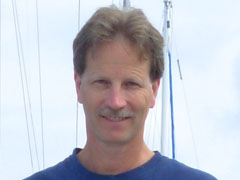Chuck Tracy
Chuck Tracy

| Manager: | Chuck Tracy |
|---|---|
| Field: | Salmon Harvest Management |
| Affiliation: | Pacific Fishery Management Council |
| Hometown: | Yuba City, California |
| Managing Since: | 1985 |
| Favorite Seafood Dish: | BBQ Spring Chinook |
I grew up in Yuba City, California and attended college at Humboldt State University, earning a BS in Biological Oceanography as well as doing graduate work in Estuarine ecology.
What originally attracted me to the field of fisheries management was the opportunity to work on Columbia River sturgeon research and management when those programs were new. Not much work had been done with sturgeon, and it was exciting to be on the cutting edge of that field.
Generally my job involves coordinating Council management of ocean salmon fisheries off the coasts of Washington, Oregon, and California. Specific tasks include staffing advisory bodies for the Council – the Salmon Technical Team, Salmon Model Evaluation Workgroup, and Salmon Advisory Subpanel. The STT conducts analysis of the effects of management regulations on stock status, evaluates effectiveness of management strategies, monitors fishery performance, and compiles fishery statistics and spawning escapement. The MEW evaluates the harvest models used by the STT to estimate fishery impacts, modifies the models when necessary or appropriate, and develops new models for management. The SAS is made up of industry and conservation representatives, develops management alternatives for Council consideration, and advises the Council on management effects to the industry. My role is to assure that the information provided by advisory bodies addresses Council needs and contributes to the Council’s decision processes. I set meeting agendas, coordinate and edit reports developed by the advisory bodies, and facilitate meetings.
I also develop briefing materials for Council meetings – I provide a summary of topics before the Council, coordinate reports and presentations for advisory bodies, agencies, and the public, advise the Council on interpretation of the salmon Fishery Management Plan, and summarize Council decisions.
My work is part of a process that ensures salmon stocks are managed in a sustainable manner, that the needs of both salmon and salmon fishermen are considered in the management process, and that the process uses the best available science.
I see several possible benefits of Project CROOS and Pacific Fish Trax. The potential for better information on fish distribution and origin in ocean catch could lead to more accurate models, which in turn means less chance for overharvest and more opportunity for fishermen to harvest abundant stocks. Simply making the public aware of what is occurring in salmon fisheries is also a significant benefit.
